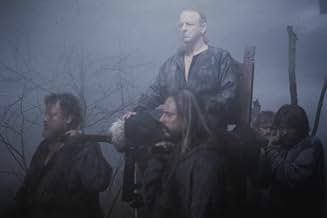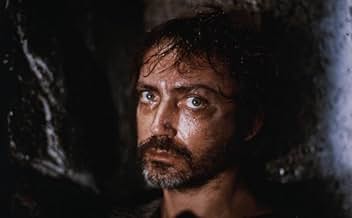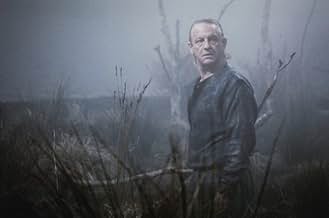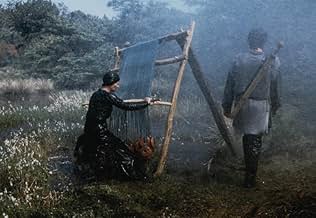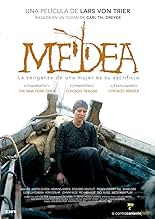AVALIAÇÃO DA IMDb
7,1/10
3,8 mil
SUA AVALIAÇÃO
Adaptação da tragédia grega de Eurípides, um olhar chocante sobre a mente perturbada e a vingança de uma mulher desprezada e abandonada.Adaptação da tragédia grega de Eurípides, um olhar chocante sobre a mente perturbada e a vingança de uma mulher desprezada e abandonada.Adaptação da tragédia grega de Eurípides, um olhar chocante sobre a mente perturbada e a vingança de uma mulher desprezada e abandonada.
- Direção
- Roteiristas
- Artistas
Avaliações em destaque
Watching this makes me lament Trier. It's good work. It's more than that, in fact. Beautiful pictures are not uncommon in film. In fact, they are getting so banal, say a postcard-perfect sunset, that we (both viewers and makers) often actively seek ugliness, some imperfection that conveys flawed - human - intimacy. Trier has flitted between the two notions (his Dogme entirely devoted to the latter), mixing and matching in a variety of projects down to his recent Melancholia.
But there are really few makers who can consistently furnish the sunsets, and link between them, that reveal something of planets in their orbits. Tarkovsky is king of that close vision from faraway. Watching this makes me lament Trier, because he could have been our current Tarkovsky, much more than either Tarr or Kusturica, who both flirted with carrying the mantle of that cosmogonic art.
This one lacks that orbital vision in different narrative planes (we only have one thread), and is mostly, rapturously devoted to tone poetry of elemental intimacy. It was very early in Trier's career anyway, but it's still a better and more visual third film than most directors ever managed. It's beautiful, but not in the clean sense of a David Lean epic. I prefer it this way.
That is partly because he's working from a barebones story that is ancient myth as interpreted by Euripides (and written into a script by Carl Dreyer): Medea has fled to Corinth promised marriage by the Argonaut Jason, who reneges on that promise when offered the hand of the daughter of the local king. Medea together with her two children is banished from the city.
It is a simple story of injustice. You are going to anticipate every turn, including (probably) the most tragic finale. It is the conventional Medea of myth, betrayed mother, woman, vengeful enchantress of cthonic witchcraft.
But the visual bell boom of this Rublev stretches far and wide, as he rings into being a gauzy world of untime, last fires, and first voyages out to cloudy sea. If only he hadn't lost himself in anger and cynical pessimism.. Tarr has followed suit. I think about the only thing that can keep an intelligent mind sane, is finding rhyme and music in unreason.
But there are really few makers who can consistently furnish the sunsets, and link between them, that reveal something of planets in their orbits. Tarkovsky is king of that close vision from faraway. Watching this makes me lament Trier, because he could have been our current Tarkovsky, much more than either Tarr or Kusturica, who both flirted with carrying the mantle of that cosmogonic art.
This one lacks that orbital vision in different narrative planes (we only have one thread), and is mostly, rapturously devoted to tone poetry of elemental intimacy. It was very early in Trier's career anyway, but it's still a better and more visual third film than most directors ever managed. It's beautiful, but not in the clean sense of a David Lean epic. I prefer it this way.
That is partly because he's working from a barebones story that is ancient myth as interpreted by Euripides (and written into a script by Carl Dreyer): Medea has fled to Corinth promised marriage by the Argonaut Jason, who reneges on that promise when offered the hand of the daughter of the local king. Medea together with her two children is banished from the city.
It is a simple story of injustice. You are going to anticipate every turn, including (probably) the most tragic finale. It is the conventional Medea of myth, betrayed mother, woman, vengeful enchantress of cthonic witchcraft.
But the visual bell boom of this Rublev stretches far and wide, as he rings into being a gauzy world of untime, last fires, and first voyages out to cloudy sea. If only he hadn't lost himself in anger and cynical pessimism.. Tarr has followed suit. I think about the only thing that can keep an intelligent mind sane, is finding rhyme and music in unreason.
"Medea" is a truly haunting film, but you have to be a true lover of cinema to appreciate this gem.
The cinematography is ground-breaking, and at times it's hard to figure out exactly how the images are being filmed. Sometimes it appears that the film was shot, then filmed again off of a television screen. That's not to say that the images aren't beautiful and breathtaking, just that they're a little unorthodox.
I won't go into the storyline, as you can read the synopsis above, but rest assured, if you're a film buff who truly appreciates a fluid film that rewards the eyes, mind, ears, and heart, this film will leave you very satisfied.
On the other hand, if you're a high school girl who is more interested in checking the text messages on her cell phone than watching the required film in class, then you'd better go down to the multi-plex real quick.
The cinematography is ground-breaking, and at times it's hard to figure out exactly how the images are being filmed. Sometimes it appears that the film was shot, then filmed again off of a television screen. That's not to say that the images aren't beautiful and breathtaking, just that they're a little unorthodox.
I won't go into the storyline, as you can read the synopsis above, but rest assured, if you're a film buff who truly appreciates a fluid film that rewards the eyes, mind, ears, and heart, this film will leave you very satisfied.
On the other hand, if you're a high school girl who is more interested in checking the text messages on her cell phone than watching the required film in class, then you'd better go down to the multi-plex real quick.
As every art-house director knows, for mood and atmosphere you only need cut out the dialogue - that's easy. Every line of dialogue makes the action more human, more trivial - which may be the main reason why Shakespeare's plays have little emotional value, no matter how rich the poetry and how high the body count. I mention Shakespeare because the visual presentation here kept reminding me of Hamlet, and no doubt Trier could do a good one because he adds plenty of artistry to the most pared-back ideas. It's not rich, but sparse and fragmentary, like a tattered cloth buffeted by the wind, like patches of memory. The characters merge with the natural elements on several occasions, the sea, the windblown grass.
Medea is very much trapped in an imposed psychology, as are we all. The gods are pulling all the strings, or so it seems. She is not callous, not mechanical in killing her children, but tortured as she does fate's bidding. The children are part of the same system and must play their role in honouring their mother's agony. The tragedy is in the passive resignation. Trier communicates this far better than Pasolini, who communicated next to nothing in his version. We're watching someone plumb the very abyss of misery on account of simple vanity. That has always been worth some reflection.
Medea is very much trapped in an imposed psychology, as are we all. The gods are pulling all the strings, or so it seems. She is not callous, not mechanical in killing her children, but tortured as she does fate's bidding. The children are part of the same system and must play their role in honouring their mother's agony. The tragedy is in the passive resignation. Trier communicates this far better than Pasolini, who communicated next to nothing in his version. We're watching someone plumb the very abyss of misery on account of simple vanity. That has always been worth some reflection.
Fascinating film which was filled with wonderful experimental cinematic effects. I'd love to have a 4K version of it. What spoilt for me it was that Lars Von Trier doesn't know that there is NO TIDE in the Mediterranean!
10sixwings
Brilliant expose' and depiction of the classical Greek play. I never had any feeling of sympathy for the character of Medea. I always found her murderous rage against her husband reprehensible. No hatred or anger can justify murdering one's own children. But for the first time, I felt a sadness and compassion towards Medea. Lar Triers treatment and subsequent rendition of Medea's plight made me think of her more than just as a "woman scorned" and I finally understood what moved her to this sacrilegious act of infanticide. Jason was her entire life and the one that she should have killed. So in his absence, she slew his progeny. She wanted to wipe any trace of him from the earth and from her heart. So she destroyed everything at once including herself. There would never be any chance of returning after this unforgivable act.
This is the definitive Medea. Lars Triers deserves praise for bringing this tragedy into focus. For making Medea human instead of a monster he deserves our gratitude.
This is the definitive Medea. Lars Triers deserves praise for bringing this tragedy into focus. For making Medea human instead of a monster he deserves our gratitude.
Você sabia?
- CuriosidadesLudmila Glinska's only film role. She plays 'Glauce' and is credited as Ludmilla Glinska.
- ConexõesFeatured in Tod eines Weltstars (1992)
Principais escolhas
Faça login para avaliar e ver a lista de recomendações personalizadas
Detalhes
Bilheteria
- Faturamento bruto nos EUA e Canadá
- US$ 16.714
- Fim de semana de estreia nos EUA e Canadá
- US$ 2.379
- 20 de abr. de 2003
- Faturamento bruto mundial
- US$ 16.714
Contribua para esta página
Sugerir uma alteração ou adicionar conteúdo ausente


